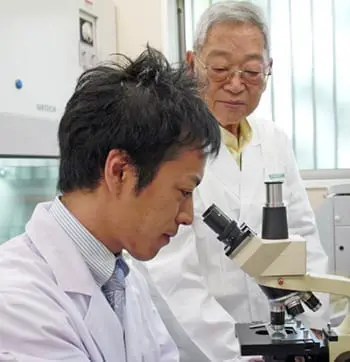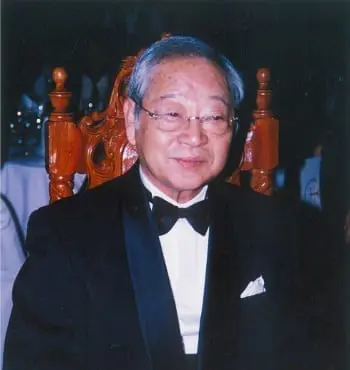Doctor Iichiroh Ohhira and his Probiotic Formula
OM-X Developer – Dr. Ohhira’s Probiotic Formulas

Dr. Ohhira in the Lab with his protégé, Dr. Muneaki Takahata
Dr. Iichiroh Ohhira, award-winning microbiologist and developer of Dr. Ohhira’s Probiotic formulations was born in Osaka, Japan in 1936. He attended Okayama University, receiving his initial post-graduate degree from the school of agriculture. Upon graduation, Dr. Ohhira worked as a landscape architect, which provided him with his first exposure to lactic acid bacteria. While on a job in Malaysia he became ill and to help ease his digestive discomfort, a resident offered him a “magic elixir” that “mysteriously and quickly” relieved his gastrointestinal distress while at the same time spurring his professional curiosity.
After studying the Malaysian product as an amateur scientist, Dr. Ohhira was determined to learn the secrets of the “magic elixir” and how it may benefit mankind. He then returned to Okayama University to earn his post-graduate degree in microbiology. During and after his studies leading to a doctorate in microbiology, Dr. Ohhira continued his studies and discovered that the drink was a fermented food containing various beneficial strains of lactic acid bacteria. He also learned that the strength of the lactic acid bacteria in the drink was derived from the many years of natural temperature fermentation that permitted the healthy bacteria to get stronger, while the weak bacteria died off.
Dr. Ohhira focused on a large number of fermented foods in Southeast Asia and investigated the characteristics of each lactic acid bacteria. After comparing the functionalities of 189 kinds of lactic acid bacteria, which were isolated from many different fermented foods, and repeating numerous experiments, he eventually found one lactic acid bacteria that possesses about 6.25 times higher proteolytic activity than common lactic acid bacteria. His discovered a lactic acid bacterium was named “TH10,” and Dr. Ohhira believed he could create a quality-fermented food with his newly discovered LAB.
Dr. Ohhira intrinsically understood and respected nature’s timeline and was driven by the passion of developing a methodology for fermentation that would allow him to contribute to a global level, that would bring good health and long life to all of humanity. For his fermentation process itself, he only selected domestically grown vegetables and fruits as ingredients that were at the peak of their nutritional values. He checked various combinations of lactic acid bacteria and went through many repetitions of trial and error.

Dr. Ohhira receives the “GUSI Peace Price” for Scientific Discovery of TH-10
After more than ten years of scientific studies, Dr. Ohhira and his team of research scientists from Okayama University concluded that they sufficiently understood the “secrets” of lactic acid bacteria and were ready to begin their efforts to duplicate the “concoction’s” ingredients, thus enabling them to offer people the curative effects of the mixture that had made such an impact on Dr. Ohhira years before. This was the humble origin of what has become known in North America as, Dr. Ohhira’s Probiotics.
In 1991, The Japanese Dairy Science Association honored Dr. Ohhira for his paper describing a unique strain of lactic acid bacteria – E. faecalis TH10. This strain was determined to be 6.25 times stronger than any other strain of lactic acid bacteria known to bacteriologists. It is found only in Dr. Ohhira’s Probiotics® and other various probiotic supplements and products formulated by Dr. Ohhira.
Dr. Ohhira was honored internationally for the development of Dr. Ohhira’ s Probiotics. He received several Presidential Citations from the International Medical Association and in 2004 became the first Japanese to win the in the field of Scientific Discovery, which is the equivalent to the “Nobel Peace Prize”.
Dr. Ohhira has authored or coauthored more than 20 scientific articles on lactic acid bacteria. His primary areas of scientific research include:
- Research and development of anti-allergy foods, utilizing lactic acid bacteria and other useful microorganisms.
- Promotion of chemical-free organic farming and fruit cultivation, including prevention of continuous cropping-related problems, through the use of lactic acid bacteria and various valuable organisms.
- Research in chemical-free golf courses, exploiting the benefits of lactic acid bacteria and other useful microorganisms.
Dr. Ohhira was a distinguished member of the New York Academy of Sciences, Japanese Society of Bacteriology, Japan Health Food & Nutrition Food Association, Brewing Society of Japan, Japanese Society for Food Science and Technology, Japanese Society of Food Microbiology, Japan Society for Bioscience, Biotechnology and Agrochemistry, Japanese Dairy Science Association, Japanese Society of Soil Science and Plant Nutrition, Japan Society for Lactic Acid Bacteria, Japanese Society of Veterinary Science, Japanese Society for Virology and Society for Antibacterial and Antifungal Agents. He had lectured at universities in Japan, Korea, and Malaysia and has consulted with various governmental entities in China. He was a 2004 recipient of the prestigious “Gusi Peace Prize”.
Troubled by a Term? Visit Glossary of Probiotic Terminology

